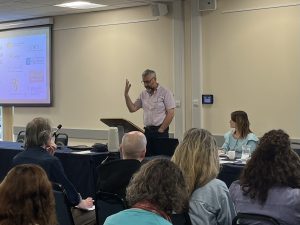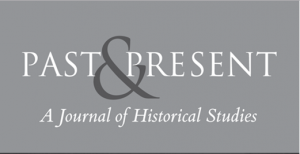by Dr. Sarah Moxey (Open University)
Over the last decade or so contemporary Scottish politics has been a dominant topic on the news agenda, however, Scottish political history has not received the same spotlight. The Histories of Scottish Politics in the Age of Union c.1700-1945 conference, held at Durham University in July with the support of the Past and Present Society, put Scottish political history firmly into the limelight.
Spread over two days, this conference featured the very best in research and innovation in the field of Scottish political history. The timeframe of the conference showed how much politics has been democratised over the centuries, from Laura Stewart’s paper on the Scottish Constitution, showing the declining influence of the church in politics; to the role of the aristocracy through political networks and clan politics, as explored by Brendan Tam, Edwin Sheffield and Tom Pye; and the breakthrough of the working classes into Scottish politics, including through the Chartists and cooperative communities, as discussed by Dominic Barron-Carter, Sonny Angus and Dave Steele. All these papers highlighted the vast changes in political engagement within Scottish society and Scottish politics over three centuries.
This was also seen in the opening panel on courtroom politics. Kajsa Varjonen’s examination of how the prosecution of malt tax rioters was politicised was a fascinating insight into political tensions during the early days of the Union. Valerie Wallace’s exploration of the politics of subjecthood expanded upon this idea and Emma McLeod then offered a comparative study of Scottish sedition trials. Finally, Rachel Bennett and Lauren Darwin’s joint paper explored the more favourable treatment received by Scots charged with blasphemy. These impressive papers demonstrated that the distinctiveness of Scots law really shaped political relations during the early years of the union.
A stand-out panel on women in politics revealed their changing roles between the eighteenth and twentieth centuries. Natalee Garrett illuminated the role played by the Duchess of Gordon in fostering a sense of Scottishness in Georgian London through the use of society events, while Hannah Speed analysed the longer-term impact of the women’s suffrage movement on the individuals involved. Lisa Berry-Waite’s discussion of Scotland’s first female MP, the Duchess of Atholl, and Katie McCrossan’s paper on politics of the women’s co-operative movement showed the progress made by women from the role of political hostess to entering frontline politics. The breadth of research material here showed that art, fashion and memoir can be valuable sources to the political historian.
The first afternoon ended with Ewen Cameron’s keynote, ‘Where did the nineteenth century go?’ In a wide-ranging speech, he addressed the issue of trends in the field as well as noting that the digitisation of sources has opened new avenues for research. Cameron concluded that Scottish political history is ‘more in the centre of gravity of Scottish history than it has been, but it should not be forgotten that it remains a crucial century for understanding subsequent history.’ Katie McCrossan’s thoughtful response suggested that Scottish politics and political history has often suffered from increasing centralisation, but added that the conference had revealed that the political history of Scotland was indeed ‘more complex and vibrant than we realised’.

Ewen Cameron gives the Keynote at the “Histories of Scottish Politics in the Age of Union c. 1700-1945” Conference, Durham University Summer 2024, photograph by Naomi Lloyd-Jones, all rights reserved (2024)
Katie’s words certainly carried over into day two of the conference, where the panels continued to feature discussion of ideas of complexity and vibrancy. My own panel on twentieth-century politics posed questions on underexplored aspects of political history, from Jim Tomlinson’s consideration of whether there was a distinctive ‘Scottish economy’, to my paper asking why the period of the Second World War in Scottish politics has been so overlooked, and Mathew Nicolson’s thoroughly researched paper on island politics in Orkney and Shetland and the Liberal revival there.
An enjoyable mid-morning panel on constituency politics showed the political flexibility and opportunities for political advancement created by the union. Gary Hutchison considered the Scottish Conservatives moving south in the period 1832-68, while Kyle Thompson noted the opposite problems of English Liberal carpetbaggers searching for safer seats at the turn of the twentieth century. Martin Spychal explored Scottish county politics, noting problems with registers and fictitious voters, and shared the progress of the History of Parliament project, a valuable resource to conference attendees.
The spaces and places panel generated much discussion and admiration for the topics covered by the speakers, Thomas Archambaud, Petra Johana Poncarová and Oli Betts. From Scots in India, to Gaelic magazines and the politics of railway construction, the reaction from these papers spilled over to the lunch break, drawing appreciation for the variety of topics coming under the umbrella of Scottish political history. One of the final panels featured new avenues of exploration, including David Torrance’s insight into how devolved government in Northern Ireland acted as a model for those wishing the same for Scotland, and Stuart Neave’s innovative paper on how scientific terminology entered discussions around federalism and interpretations of the constitution. This panel showed the originality which continues to emerge in the field of Scottish political history.
The closing roundtable discussed the future of political history, beginning with Colin Kidd reflecting on his own experiences of the way Scottish political history has developed over his career. Conference organiser and roundtable host Naomi Lloyd-Jones agreed that explorations of the new political and the new British history are rarely seen together in the discipline. Valerie Wallace shared her perspective that looking beyond Scotland’s geographical boundaries for the wider influence of Scottish political history could be a fruitful direction for the field. Emma MacLeod asked valuable questions about how we define political history, as politics is comprised of power relationships – a definition can be applied widely. Malcolm Petrie commented how ‘uplifting and reassuring’ the conference had been in showing a strong future for the study of Scottish political history.
It was indeed a heartening note to end the conference on. While throughout the two days there had been much discussion of political arguments and debate, the atmosphere of the conference was the complete opposite. Instead, it had been that of supportive and friendly compatriotism, something which attendees frequently remarked upon. Conference organiser Naomi-Lloyd-Jones is to be heartily congratulated for creating such an outstanding event and fostering such a welcoming and inclusive atmosphere. It was an inspiring event to be a part of, which showed the future of Scottish political history is very bright indeed.
Past & Present was pleased to support this event and supports other events like it. Applications for event funding are welcomed from scholars working in the field of historical studies at all stages in their careers.

